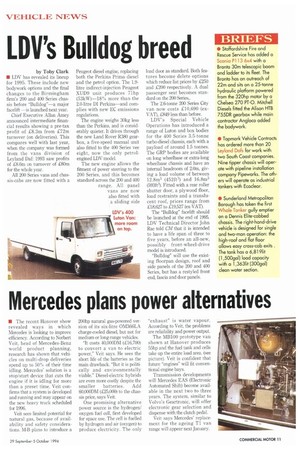Mercedes plans power alternatives
Page 13

If you've noticed an error in this article please click here to report it so we can fix it.
• The recent Hanover show revealed ways in which Mercedes is looking to improve efficiency. According to Norbert Veit, head of Mercedes-Benz world product planning, research has shown that vehicles on multi-drop deliveries spend up to 50% of their time idling. Mercedes' solution is a stop/start device that cuts the engine if it is idling for more than a preset time. Veit confirms that a system is developed and running and may appear on the new heavy truck scheduled for 1996.
Veit sees limited potential for natural gas, because of availability and safety considerations. M-B plans to introduce a 200hp natural gas-powered version of its six-litre 0M366LA charge-cooled diesel, but not for medium or long-range vehicles.
"It costs 40,000DM (£16,700) to convert a van to electric power," Veit says. He sees the short life of the batteries as the main drawback. "But it is politically and environmentally viable." Diesel-electric hybrids are even more costly despite the
smaller batteries. Add 60,000DM (as,000) to the chassis price, says Veit.
One promising alternative power source is the hydrogen/ oxygen fuel cell, first developed for space use. The cell is fuelled by hydrogen and air (oxygen) to produce electricity. The only "exhaust" is water vapour. According to Veit, the problems are reliability and power output.
The MB10 0 prototype van shown at Hanover produces 55hp and the fuel tank and cells take up the entire load area. (see picture). Veit is confident that future "engines" will fit conventional engine bays.
Transmission developments will Mercedes EAS (Electronic Automated Shift) become available in the next two to three years. The system, similar to Volvo's Geartronic, will offer electronic gear selection and dispense with the clutch pedal.
Veit says Mercedes' replacement for the ageing Ti van range will appear next January.




























































































